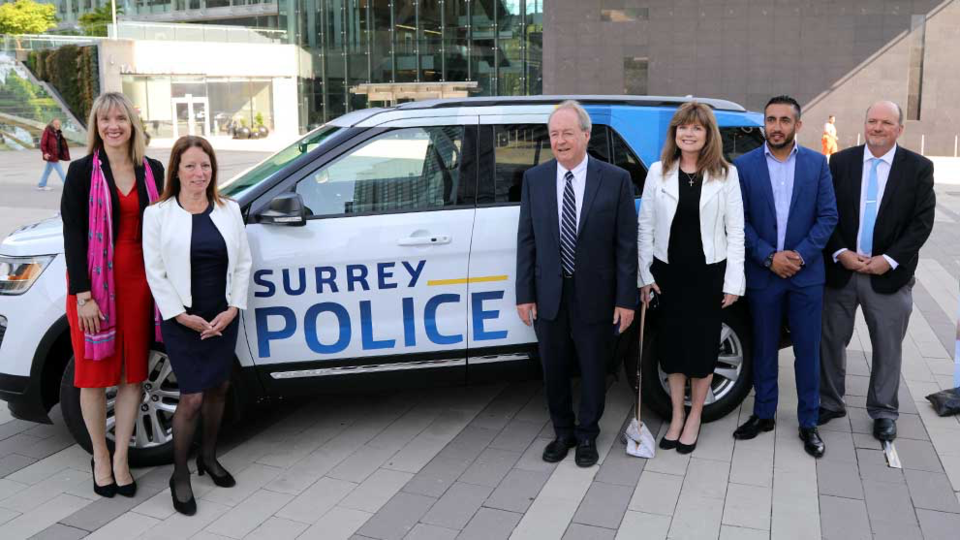Although Surrey mayor Doug McCallum has celebrated a new transfer agreement between the RCMP and the Municipal Pension Plan, Mounties are taking a wait-and-see approach.
Pension portability is considered a significant factor for Surrey’s Mounties to consider transitioning to the proposed Surrey Police Department, said Brian Sauve, spokesperson for the National Police Federation, which became the certified bargaining agent of non-management RCMP members in July.
The Surrey Policing Transition Plan report of May 2019 indicates the city will be prioritizing recruitment of experienced officers and those more connected to the community.
“It would be natural to expect a significant amount of interest among current Surrey RCMP members,” notes the report.
But job opportunities and pensions, said Sauve, will play a key role in determining how many RCMP officers stay in Surrey if the provincial government ultimately approves a new municipal force.
McCallum said in a news release last week that the pension agreement is “a major milestone in the creation of our own city police department” and “it more importantly answers a significant and legitimate concern expressed by RCMP members and families about pension portability.”
The Surrey police force would have its pensions managed by the Municipal Pension Plan, whose assets are managed by the British Columbia Investment Management Corp.
Surrey has 792 RCMP officers on duty (however, there are 51 vacancies) and plans to have 805 municipal police officers by April 2021, when the transition is set to commence. There are another 325 civilian positions and 20 community safety personnel to consider in the proposed recruitment process.
Sauve said pension calculations will be based on individual contributions to date and will vary as such. “The devil’s in the details,” said Sauve.
“It’s obviously a hurdle that’s been overcome, and members will do calculations.
Whether it will be in their favour remains to be seen,” he said.
“It’s an advantage from a recruiting-poster perspective but there’s a lot of fine print and some of it’s to be determined,” added Sauve.
The federation, which is headed for its first round of collective bargaining, has a membership of over 18,000 RCMP members. Surrey’s RCMP detachment is the largest in Canada and is twice as large as the second-largest, Burnaby, according to the report.
The report indicates any shortfall in recruits from the Surrey RCMP will be made up for in new officers from the Justice Institute of B.C. and other recruitment avenues.
The report notes, “working for the Surrey PD might be appealing to experienced officers (i.e. with ERT, dog handling, or investigative experience) who enjoy their current duties but may not have an opportunity to continue in their specialized roles at their home department.”
However, Sauve said, there are career opportunities the RCMP can offer that a municipal force cannot, such as national security, anti-terrorism and special units. As such it will not be as simple for members to remain in Surrey.
Sauve said RCMP members are “disappointed the municipality went that way and the province took it a step further.”
He said the federation sides with councillors who have opposed the transition process as “it’s all been done in secret; what’s been made public has been done in secret.”
Sauve said RCMP officers have yet to have a representative invited to have their say in how the transition occurs.
B.C. Solicitor General Mike Farnworth appointed former attorney general Wally Oppal to chair a transition team to consist of provincial and municipal appointees.
Oppal told Glacier Media details of the team, including its terms of reference, have yet to be made known to him by Farnworth’s office.
Oppal said it is too early to know if the transition team will operate behind closed doors or hold public meetings.
While the team of up to six people will discuss transition issues, it is up to the province to simultaneously appoint members to a volunteer police board, which will then choose a police chief. The board, like any other, will include one member of Surrey City Council and will be chaired by the mayor.
McCallum is expected to name one of the four council members who remain allied with him under his civic political slate, Safe Surrey Coalition, after three left this year citing concerns of transparency.
While McCallum wants the transition to commence April 1, 2021, Oppal was more cautious on his timeline.
“I know there are people who want this thing done in a hurry but it must be done right. This is a very complex procedure that starts at the bottom.”



